Many people take a probiotic supplement every day because of the healthy gut bacteria found in probiotics.
It’s a fabulous way to improve your gastrointestinal health and overall well-being.
Want to find the best probiotics on the market? Our research team put together these rankings to find the cleanest and most effective probiotic supplements:
1. NOW Probiotic-10
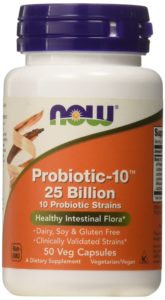
Click here for the lowest price on Amazon
This might be the equivalent of a carpet bombing of bacteria. NOW Probiotic-10 is named as such because it contains ten different probiotic bacteria strains, which total to an eye-popping 25 billion colony forming units.
The bacteria are delivered via a vegetarian capsule, and NOW Probiotic-10 uses standard “unbranded” bacteria strains, which both saves you money and guarantees that you are getting the same specific strains that are used in scientific studies on the benefits of probiotics.
With a simple cellulose capsule, some of the bacteria might be lost to stomach acid, but the huge overall bacteria count should more than make up for this.
2. Garden of Life Primal Defense Ultra
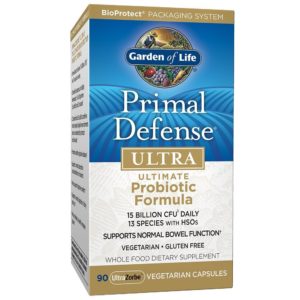
Click here for the lowest price on Amazon
Garden of Life always has an interesting take on supplements, and their Primal Defence Ultra probiotic is no exception. The thirteen strains of probiotic bacteria are supported by a matrix of organic oat grass processed with an enzymatic procedure to help bacteria growth, as well as a small amount of iron, which is known to massively boost bacteria growth inside the body.
They also include “ionic plant based minerals,” presumably to boost growth further. Garden of Life generally has a love it or hate it approach; if you want all the extras, it’s a great choice, but if you just want plain old bacteria in a pill, there are better options.
3. Nutrition Essentials Probiotic
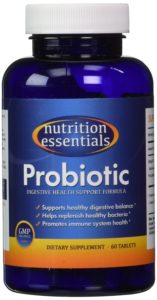
Click here for the lowest price on Amazon
If you want a “bacteria bomb,” look no further: Nutrition Essentials crams some 15 billion colony forming units into their tablets, along with half a gram of “pre-biotic” materials that foster the growth and reproduction of the bacteria. Nutrition essentials is different from some of its competitors in that it is comprised of just one probiotic bacteria, bacillus coagulans.
Fortunately, this is one of the better-researched probiotics, with research to date finding that it is a safe and effective treatment for irritable bowel syndrome and related gastrointestinal problems (1). The tablet is a pretty simple one, made of calcium carbonate, cellulose, and stearic acid, so it may face some problems getting the bulk of the probiotic bacteria into your intestines, but the high number of bacteria colony forming units to begin with should help offset that problem.
4. Hyperbiotics PRO-15
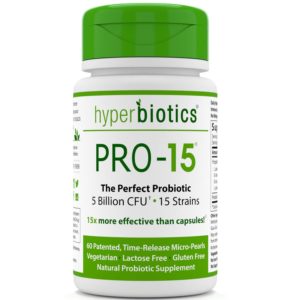
Click here for the lowest price on Amazon
Given its popularity, you’ve got to assume Hyperbiotics is doing something right. Their formulation packs fifteen different bacteria strains into their proprietary blend of probiotics. The total amount of live colony forming units is five billion, but since these bacteria are alive, they do die off over time (this is the same for any probiotic supplement). Even at the time of expiration, Hyperbiotics guarantees 1.5 billion colony forming units.
Hyperbiotics also employs a proprietary “pearl capsule” technology to help fight one of the biggest enemies of a probiotic supplement: your own stomach. Their pearl capsule is intended to allow more of the bacteria to make it to your intestines to populate the gut flora. With Hyperbiotics’ allergen-free guarantee, this product is a big winner.
5. Nature’s Bounty Ultra Probiotic 10
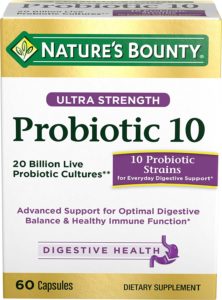
Click here for the lowest price on Amazon
The ubiquitous and trusted Nature’s Bounty brand delivers when it comes to probiotics. Their Probiotic 10 supplement contains 20 billion colony forming units and, as the name suggests, ten different strains of bacteria.
Nature’s Bounty mostly avoids using proprietary probiotic strains, so those savings are passed on to you, and they take the extra step of disclosing each specific bacteria strain included, so if you want to do your own background research on probiotic bacteria strains, you’re free to do so. The capsules are vegetarian, and there aren’t any extraneous ingredients included either, so this one’s a very solid choice.
6. Bio Schwartz Advanced Strength Probiotic
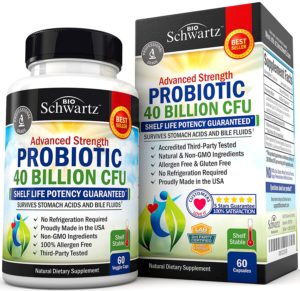
Click here for the lowest price on Amazon
Though Bio Schwartz includes a huge amount of bacteria (40 billion colony forming units!) the choices of which ones to include are a little odd. The staple bacteria lactobacillus acidophilus is there, but the other three are less common and less well-researched bacteria.
The bigger brands include some of the other, better-established probiotics that have documented positive effects on the gastrointestinal system. The company also includes fructooligosaccharides to support the growth of the bacteria, but it doesn’t document how much it actually includes in the supplement.
7. Dr. Tobias Deep Immune Probiotics
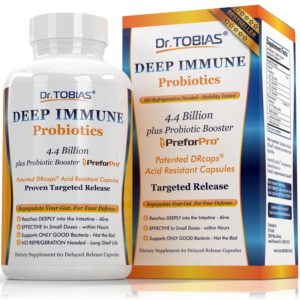
Click here for the lowest price on Amazon
The probiotic blend offered by Dr. Tobias includes five different types of bacteria which total to a bit under five billion colony-forming units. Several of these are commercial strains, like DE111 which is a special strain of the bacillus subtilis bacteria.
The degree to which these are helpful depends on the degree to which you trust the companies that make them. You’ll necessarily be paying extra for these “name brand” bacteria, but if you believe the companies, they are supposed to be more effective than a generic strain.
The capsules are another major selling point; Dr. Tobias claims that their capsules resist the digestion of the stomach acid, making it so that more bacteria make their way into the intestinal tract instead of being destroyed by stomach acid. Again, the effectiveness of this is mostly on the company to prove. All in all, though, it’s a solid product, but you do pay extra for the name recognition, both for the brand and for the specific commercial bacteria strains.
8. Herrmann Health Products Advanced Probiotic
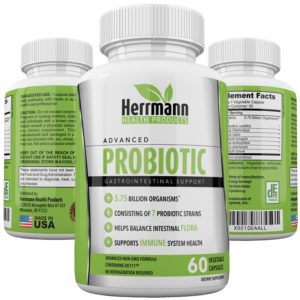
Click here for the lowest price on Amazon
With a combination of seven different probiotic bacteria, including Lactobacillus, Bifidobacterium, and Bacillus strains, Hermann Health Products offers a solid combo of healthy bacteria for a reasonable price.
It’s not particularly innovative, and its dose of 5.75 billion organisms is middle-of-the-road. The capsules are made from vegetable cellulose and some binders, but it shouldn’t offer any problems to people with dietary restrictions or intolerances.
9. Vitamin Bounty Pro 50
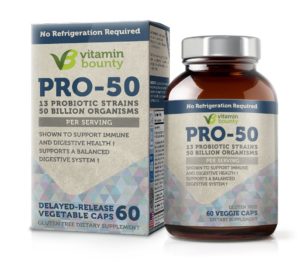
Click here for the lowest price on Amazon
Vitamin Bounty Pro is a bit tricky with its labeling. Though it claims each serving contains 50 billion colony forming units, a “serving” is actually two capsules, not one, so it’s not quite so impressive.
The probiotic selection of 13 different strains is good, but this product is expensive for how few servings are contained in one bottle. Beyond this, it doesn’t do anything extraordinary, so it’s not at the top of the pile.
10. Align Daily Probiotic
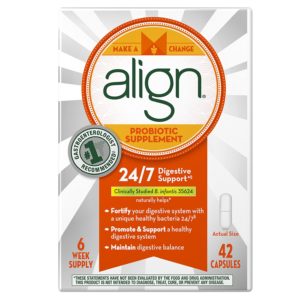
Click here for the lowest price on Amazon
Align casts itself as something of a “pharmaceutical grade” probiotic, though it is still of course an over-the-counter supplement. Unfortunately, despite its popularity and sales volume, it falls a little flat when it comes to contents.
The only probiotic is a proprietary strain of bifidobacterium infantis, and it’s included at a relatively unimpressive one billion colony forming units. The cartons are expensive, and contain a number of ingredients that don’t seem necessary, like milk extracts and sucrose. These detractions land Align Daily Probiotic pretty low on the totem pole.
Part Two: An in-depth look at probiotics
Cultivating friendly bacteria in the gut through eating foods and taking supplements that provide probiotics can help you lose weight, bump up immune function, improve your digestion, and even cut your risk of developing chronic diseases. (1, 2)
The importance of having a healthy gut doesn’t always get the attention it deserves, but research indicates it is just as vital as food choices, good sleep and exercise.
We have ten times as many bacteria in our bodies as we do cells, and most of them live in the gut.
When these microorganisms are happy, we enjoy health benefits; when bacterial colonies aren’t thriving, we may suffer a range of negative effects. (3)
Certain types of yeast can also act as probiotics, but most of the conditioning required for keeping the gut healthy is performed by colonies of bacteria.
Probiotics can be taken in supplement form, and may also be ingested by eating foods prepared through fermentation processes that encourage the growth of friendly bacteria.
Some popular fermented foods include kefir, kimchee, sauerkraut, tempeh and yogurt.
You may also be familiar with prebiotics, which are dietary fibers that actually feed friendly gut bacteria. (4)
Benefits
Researchers have identified dozens of types of bacteria known to impart health benefits; two common groups include bifodobacterium and lactobacillus, which are further broken down into sub-species. Within these species, many more individual strains exist.
Each kind of probiotic appears to affect different aspects of overall health, so selecting the right type or combination of types is important.
Supplements that contain several types of probiotic are known as multi-probiotics, or broad-spectrum.
The study of how probiotics affect health is relatively new, so evidence regarding some of the potential benefits may not be conclusive at this time. (5)
Communities of bacteria live mostly in the large intestine; this is the final stretch of the digestive tract we refer to as the colon.
These “gut flora” are made up of hundreds, or possibly thousands, of different types of bacteria, viruses and yeast, although there are more bacteria than other kinds of microorganisms. (6)
The way these communities work together metabolically is similar to an organ. For example, gut flora manufactures some of the B vitamins as well as vitamin K2. (7)
It can also turn fiber into short-chain fatty acids that perform other functions, such as feeding the gut wall and activating the immune system. (8)
Bacterial communities work to maintain the integrity of gut wall, which is vital in preventing substances in the colon from leaking into other parts of the body and stimulating an immune response. (9, 10, 11)
Besides friendly bacteria, harmful gut flora also exist, and when the balance gets out of whack, it can lead to diseases like type 2 diabetes, metabolic syndrome, heart disease, depression, Alzheimer’s disease, colorectal cancer and many more. (12, 13, 14, 15)
Both prebiotics and probiotics can help correct imbalance and insure optimal function of gut flora. (16)
This is the area where the most research has been done on probiotics, especially in regard to diarrhea associated with taking antibiotics. (17)
Diarrhea often occurs after a course of antibiotics is taken to treat a medical condition, and can persist for long periods of time. Antibiotics eradicate many bacteria in the gut, and this can shift the balance so bad bacteria dominate and thrive.
Many studies indicate probiotics can cure this problem (18, 19), as well as being effective in reducing bloating, gas, constipation, and other intestinal problems, including symptoms associated with irritable bowel syndrome (IBS). (20, 21)
Probiotics can assist in treating ulcerative colitis and Crohn’s disease (22), and may also help fight helicobactor pylori infections, which are caused by the bacteria that leads to ulcers and raises the risk of stomach cancer. (23)
Anyone who has digestive issues that have been difficult to resolve might consider taking a probiotic supplement.
If you’re carrying around a significant amount of extra weight, chances are your gut flora are different than someone who is thin or of normal weight. (24)
Researchers playing with this concept transplanted gut flora from thin animals into obese animals, and the result was dramatic: fat animals began to lose weight. (25)
Human studies indicate that having the right gut flora can help with weight control. (26, 27)
Data from a study conducted in 2013 with more than 200 people suffering from central obesity (large amounts of belly fat) offered encouraging results: over three months, participants taking the probiotic lactobacillus gasseri had an average decrease of 8.5% in belly fat mass. (28)
It took only a month for test subjects to gain back the belly fat they lost after they stopped taking the probiotic.
Another study indicated that Bifidobacterium and lactobacillus ramnosis may help in preventing obesity and supporting weight loss. (29)
The use of probiotics has been associated with improvements in a range of other health conditions, including:
- Drops in blood pressure for patients with hypertension (30)
- A reduction of systemic inflammation (31)
- Enhanced immune system function (32)
- Lower total cholesterol and LDL cholesterol measurements (33)
- Improvements in skin conditions such as rosacea, acne and eczema (34)
- Reduced symptoms in patients suffering from depression and anxiety (treated with these strains: bifidobacterium longum and lactobacillus helveticus) (35)
Potential health benefits resulting from these effects may include a decreased risk of developing chronic Western diseases like autoimmune diseases, mental disorders, arthritis and heart disease. Further research is likely to reveal even more health advantages associated with healthy gut flora.
Side Effects
Taking probiotics is completely safe for most people, though some experience digestive side effects during the first few days; abdominal discomfort, bloating and gas are the most common problems. (36)
Improved digestion usually follows these initial symptoms.
Those with compromised immune systems, such as patients diagnosed with AIDS or HIV, have had issues with infection after taking probiotics, and anyone with a medical condition should talk with a doctor before making a decision about supplementing. (37)
If you’re looking to treat a specific health issue, it’s important to do your homework and find out which strains of probiotics have been successful in specific applications; always purchase probiotics from a trusted manufacturer.
Summary: Providing assistance to your body for cultivating friendly gut bacteria in the form of probiotics can be helpful in improving a range of health conditions, including immune system function, weight management, depression and systemic inflammation.
https://bodynutrition.org/probiotics/ http://bodynutritionorg.tumblr.com/post/164571261074

No comments:
Post a Comment